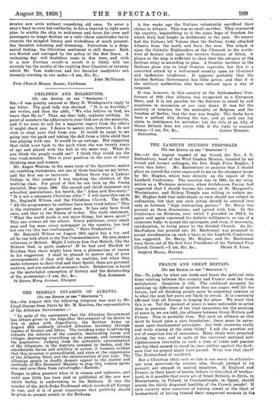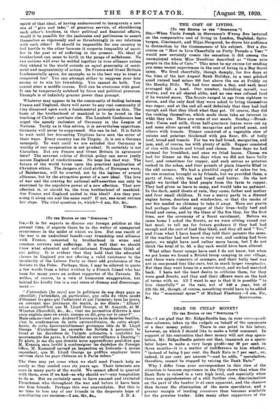SIR, —To judge by what one reads and hears the
political relas tions existing between this country and France seem far from satisfactory. Suspicion is rife. The continual necessity for patching up differences of opinion does not augur well for the future, and all thinking people must be somewhat anxious as to what tho next few years are likely to reveal. It is constantly affirmed- that all Europe is longing for peace. We trust that this is so. Yet the pursuit of peace is more noticeable in print than in practice. One of the vital necessities for the securing of peace is, we are told, the alliance between Great Britain and France. This is probably true. But such an alliance as this must be based upon a sure foundation : there must be agree- ment upon fundamental principles. Are both countries really and truly aiming at the same thing? I ask the question not out of suspicion but of uneasiness. Many ideals were preached during the war, and in spite of the universal national self- righteousness inevitable in such a time of crisis and passion one big ideal seemed to stand in clear outline against the dark- ness that we prayed might have passed. What was that ideal? The Brotherhood of mankind.
But a Christian ideal such as this is can never be attained— nor even perceived—by nations who, though pledged to its pursuit, are steeped in mutual suspicion. If England and France, in their heart of hearts, believe in this ideal of brother- hood, is it possible that every act of Great Britain, in Syria, in Mesopotamia, in Poland, in Constantinople, in Egypt, should arouse the thinly disguised hostility of the French people? If each country were conscious of having aimed at the ideal of brotherhood, of having treated their oonquered enemies in the
spirit of that ideal, of having endeavoured to inaugurate a new era of "give and take," of generous service, of shouldering each other's burdens, in their political and financial affairs, would it be possible for the jealousies and pettinesses to assert themselves so vigorously and so threateningly in our relations with each other? It should be impossible for one country to feel hostile to the other because it suspects inequality of sacri- fice in the past or of suffering in the present. No ideal of brotherhood can come to birth in the pangs of selfishness. No two nations will ever be welded together in true alliance unless they extend to the world outside an equal generosity of senti- ment and magnanimity of action. Do France and Great Britain fundamentally agree, for example, as to the best way to treat a conquered foe? You can attempt either to suppress your late enemy or to win his friendship. You cannot do both. You cannot steer a middle course. Evil can be overcome with good. It can be temporarily subdued by force and political pressure. Example is of infinitely greater power than precept.
Whatever may appear to be the community of feeling between France and England, there will never be any real community if they disagreed upon such a fundamental principle as this. The basis of the brotherhood of mankind is to be found in the teaching of Christ : nowhere else. The Lambeth Conference has urged the speedy inclusion of Germany in the -League of Nations. Tardy as is this advice, it is nevertheless opportune. Germany will never be suppressed. She can be led. It is futile to wait until her fire-eating Tirpitzes have seen the error of their ways. Every country has its Tirpitz. _It is not a German monopoly. To wait until we are satisfied that Germany is worthy of our co-operation is not prudent. It certainly is not Christian. But are France and Great Britain in agreement here? The severest critics of British policy can never justly accuse England of vindictiveness. No hope lies that way. The future of the world turns upon the practical application of Christian ethics. The dangers of civil strife, of European wars, of Bolshevism, will be averted, not by the legions of armed alliances, but by the attractive power of a new ideal. The love of war and the craving for national self-assertion can only be exorcised by the expulsive power of a new affection. That new affection is, or should be, the true brotherhood of mankind. Are France and England united in this ideal? Are they pur- suing it along one and the same road? If not, one must retrace her steps. The vital question is, which?--I am, Sir, 4:43.,
UNEASY.



































 Previous page
Previous page